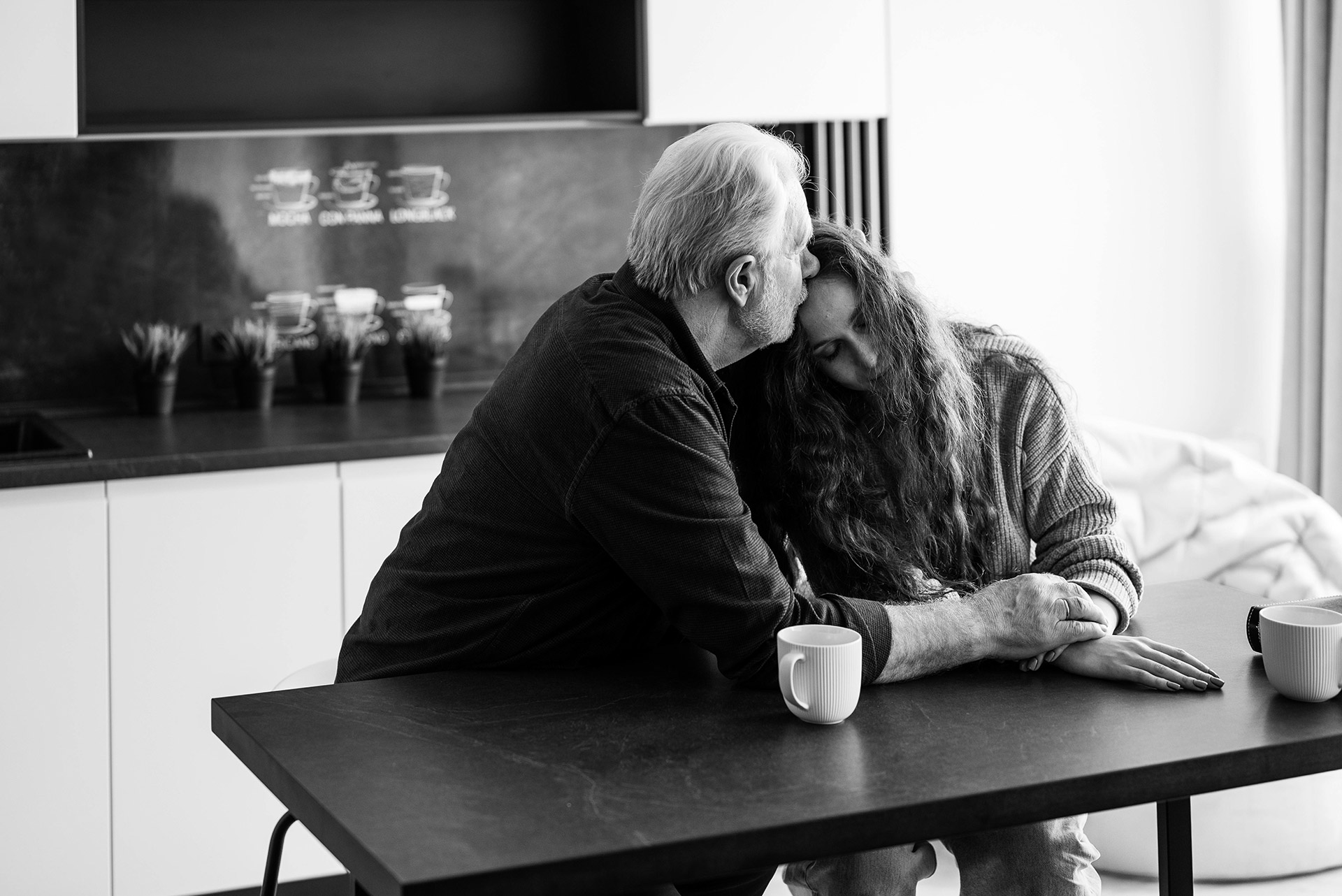
My sweet Dad, Neil, has been gone now for exactly two months. I have to admit, I feel as if I miss two guys now. There is the one I met exactly where he was as we lived and loved alongside his memory loss for a decade, and the before guy. I am finally letting the old memories flood back into focus. I kept them largely at bay in the very present and mindful way we showed up for him.
He was a brilliant advertising “Mad Man” and worked on breakthrough pharmaceuticals with top docs around the world for nearly 30 years at the same agency. I can imagine him being part of the teams working on research for the very disease we have come to know.
The Diagnosis That Changed Everything
When Dad was diagnosed with M.C.I. (Mild Cognitive Impairment), he was a single man who lived alone. The neurologist who shared this news with us suggested a daily patch that might slow the course of his newly recurring short-term memory loss. It needed to be placed out of his reach, and changed every 24 hours. He never asked if there was anyone home to do this, or a thing about what we might be looking at in our future and his.
I am one of four siblings, and in that moment, we became his care team. We learned to live through each change, navigating the delicate balance of our own households, his growing needs and dignity. Each time we averted a crisis, (and there were many) I felt the need to shout our learnings from the proverbial rooftop. “Quick, tell the others!” Don’t be shy in finding other families or support circles. We share the truths, hard stuff and short cuts!
The doctor never talked to us about what the path might look like ahead. Not a whiff or whisper of what we might encounter or how we might care for his safety, dietary needs or future support. Not even a book or website. We began our own deep dive.
Planning Ahead, Together
While he was still “sharp-ish”, we had the very important and difficult conversations about his wishes, finances, permissions and passcodes. We knew he wanted to stay in his house as long as possible and then, “what is easiest for all of you,” he said. True Dad.
He had always shared, “a simple cheap pine box, please,” when he joked about his burial. We had him update his will, name a power of attorney and healthcare proxy. We learned that end of life wishes have different laws and paperwork needs in different states.
In NY, we had a M.O.L.S.T. (Medical Orders for Life Sustaining Treatment) that was co-created with a physician. This hot pink paperwork and his meds list traveled with him everywhere. We updated it often and kept copies on all of our phones. Find out what works in your state. In this time, take a look at your own paperwork and planning – looking at our own mortality is never easy, but it is a gift to those who may care for you.
Here is some more of our Leiner-Loving advice.
Laugh, a Lot!
Don’t forget to keep your sense of humor on hand! My Dad kept his even in the deepest days of his memory loss–and it guided us through the hardest decisions and debacles! There is so much beauty along the way. We read to him, wrote to him, shared art projects and picture books. There were easy-reader biographies he loved and cooking shows that were “plot-free” and easy to follow. We brought the holidays and parties to him. From bagel brunches to Fudgie The Whale birthdays replete with balloons and Ray Charles on repeat – we celebrated him over and over again.
Call in the Troops
I wish we had known this sooner. First, we cobbled together a family team. Then we brought in someone who helped him tidy and asked if she would check in a few hours a day. He affectionately called them, “The Patchers” as they helped move his daily meds across spots on his back. Finding help is not easy and quite costly. Explore what insurance may cover, if there are local programs for daycare and even meal services.
Methods in the Madness
When his cell was left unanswered and the landline was our only connection, we swapped it for a photo phone. We programmed big buttons with our pics to autodial. We put outfits in labeled baskets, so he knew what to wear each day. We took things out of closets and out in the open. These ideas work, until they don’t and you find another way.
We never said “battle” or “surviving” – it was just meeting him in the moment and learning to live with memory loss as it showed up, on any given day.
Brain Magic
Some days there were amazing moments of his knowing our names and others of Dad telling us, “I wish I did.”. We never asked, “Do you remember”? Seems small, but it helped us all stay positive. We told him stories about him! There were days he thought he had an ad meeting, and we played right into it with him. Days we left and said, “I love you,” we often got a “love you more.” Even when he did not know names, we knew he knew we were the ones who loved him. He never forgot the name of his grandson, born while he was in memory care. A new neural pathway connected to love, of this I am sure!
Wishes & Wants
Make time to talk about the hard stuff. Where are the important papers? Passwords? End of life wishes? DNR and DNI, are not always enough from state to state. Name a healthcare proxy and power of attorney. Add your names to bank accounts, mortgages, car loans and leases, even the cable account! We put a limit on the amount of cash he took from the bank for pocket money. Preserving his autonomy and dignity were non-negotiables.
Home Again
When he could no longer live in his place, we moved Dad to an assisted living apartment with a memory care wing. We made it as warm and familiar as possible with his art, furniture and piano. We had my aunt take him to lunch and returned him to his new apartment. He knew it was going to happen, but we took the confusion out of him seeing it all go into boxes. We did a great job of making it look and feel just like home. He had autonomy over the choices he could make along the way – and this was urgently important to us and to him. “Dad, want to go to chair yoga? Um, no thanks!.” He called the shots we knew he could and helped make the decisions best for him on his behalf.
Wipe Boards
The wipe board in his home and hospital room were headquarters for the shorthand we wanted him and others to know. I have dementia. I am hard of hearing and wear hearing aids. Call me Neil.
Hospital Stays
The staff are not trained or savvy in caring for memory loss or elders. Dad needed care for many things over the course of his care. Urinary and bladder infections, a fall, fill in your blank here __. We took turns spending the night and communicated on his behalf. Everything from meal orders, advocating for his level of care and comfort were on us. Someone living close, or a plan of action is helpful.
Palliative Care & Hospice
Become familiar with healthcare services that are aimed at optimizing quality of life and reducing suffering. This is life giving, especially with a terminal diagnosis. They take care of caretakers too. Don’t wait until end of life is near to become familiar. This helped keep my Dad out of the hospital and right at home, many times over.

And Please, Take Care of You
Finally, please care of you too! Find breaks and laughter. Ask for help. Make a list of what “help” looks like, so when friends ask, you have a few ideas. Befriend the anticipatory grief you’ll meet along the way.
Most of all, love what is left. There is so much beauty and peace in looking back as I look forward. Folks remarked, “he must have been a great Dad” in witnessing his care. Caring for him alongside my siblings was the honor of my lifetime.




Thanks. This is great! I am on the journey with my mom. My dad just died. I think it was a broken heart as my mom rarely recogniZed him.
Great story that I am now living while I care for my wife
Thank you for sharing!
Thank you for sharing this story.
I am the daughter of both parents ages 92 & 101.
Both are liviing in there home still independant.
dad is 101 yrs old and his memory has changed mildly.
2015 is had a craniotomy in Puerto rico due to his hematoma which they found.
Surgery was completed at the age of 92 yrs old. He came out of it very well. Years went by and I notice changes in him which cause him to start repetive words and asking for only coffee,cheese,and crackers. he did eat his other meal, but the repetive request was driving myself (daughter) and my mother crazy. He still can function, bathing, dressing, and going out with no cane or any assistance. thank you this is a help for me as a caretaker. It is too much now and finally i have a home attendant to help while i am working. i have two brothers living in hawaii and do not attempt to come see my parents or give me a break. reason why: they really don’t care of there parents and it is a dam shame children act this way. god is good and i will be rewarded in life to be there for my parents to assist them even though i work full time. i am there 100 %. I cannot take a vacation, because both brothers, don’t want to come to give me the break i really need mentally. god help them. Even though my parents are ok for now, i will be there for them.
it is the hardest thing to do in life, care of your parents, and not able to care for yourself.
my response is, if you are not there to help your parents, you are on the same road as them, and have children that should help… i want to see if your own children take care of you… not happening.